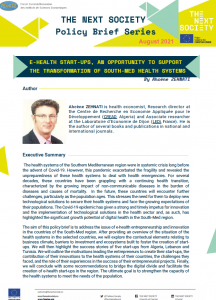 Micro, small and medium enterprises (MSMEs) constitute about 95% of total enterprises in the South Med region and are considered the driving forces of economic growth, job creation and green and inclusive growth. Entrepreneurs, particularity start-ups, still face numerous challenges when it comes to establishing, promoting and running their businesses. Providing them with support through innovative initiatives and enhancing the ecosystem where they operate will contribute to their development. In their turn, entrepreneurs will contribute to achieving several of the Sustainable Development Goals (SDGs).
Micro, small and medium enterprises (MSMEs) constitute about 95% of total enterprises in the South Med region and are considered the driving forces of economic growth, job creation and green and inclusive growth. Entrepreneurs, particularity start-ups, still face numerous challenges when it comes to establishing, promoting and running their businesses. Providing them with support through innovative initiatives and enhancing the ecosystem where they operate will contribute to their development. In their turn, entrepreneurs will contribute to achieving several of the Sustainable Development Goals (SDGs).
It is in this context that the Next Society (TNS) project and FEMISE decided to launch this initiative to produce “The Next Society Policy Briefs Series”. This series of briefs aims to better understand the challenges faced by entrepreneurs (through the lens of the entrepreneurs themselves) and to provide tailor-made operational policy recommendations. These briefs are based on collaborative work and exchange of knowledge and experience between the researcher(s)/author(s) and the entrepreneur(s), many of which have benefited from TNS project, ensuring their relevance and impact.
The first TNS/ FEMISE Policy Brief, entitled “E-health Start-ups, an Opportunity to Support the Transformation of South-Med Health Systems” by Ahcène Zehnati, Research director at the Centre de Recherche en Economie Appliquée pour le Développement (CREAD, Algeria) is available here
Summary:
The health systems of the Southern Mediterranean region were in systemic crisis long before the advent of Covid-19. However, this pandemic exacerbated the fragility and revealed the unpreparedness of these health systems to deal with health emergencies. For several decades, these countries have been grappling with a continuing health transition, characterized by the growing impact of non-communicable diseases in the burden of diseases and causes of mortality. In the future, these countries will encounter further challenges, particularly as the population ages. This stresses the need for them to deploy new technological solutions to secure their health systems and face the growing expectations of their populations. The Covid-19 epidemic has given a strong and timely impetus for innovation and the implementation of technological solutions in the health sector and, as such, has highlighted the significant growth potential of digital health in the South-Med region.
Th e aim of this policy brief is to address the issue of e-health entrepreneurship and innovation in the countries of the South-Med region. After providing an overview of the situation of the health systems in the selected countries, we will explore the contextual elements relating to business climate, barriers to investment and ecosystems built to foster the creation of start-ups. We will then highlight the success stories of five start-ups from Algeria, Lebanon and Tunisia. We will outline the motivations leading the entrepreneurs to create their start-ups, the contribution of their innovations to the health systems of their countries, the challenges they faced, and the role of their experiences in the success of their entrepreneurial projects. Finally, we will conclude with some recommendations to bridge the digital divide and facilitate the creation of e-health start-ups in the region. The ultimate goal is to strengthen the capacity of the health systems to meet the needs of the population.
e aim of this policy brief is to address the issue of e-health entrepreneurship and innovation in the countries of the South-Med region. After providing an overview of the situation of the health systems in the selected countries, we will explore the contextual elements relating to business climate, barriers to investment and ecosystems built to foster the creation of start-ups. We will then highlight the success stories of five start-ups from Algeria, Lebanon and Tunisia. We will outline the motivations leading the entrepreneurs to create their start-ups, the contribution of their innovations to the health systems of their countries, the challenges they faced, and the role of their experiences in the success of their entrepreneurial projects. Finally, we will conclude with some recommendations to bridge the digital divide and facilitate the creation of e-health start-ups in the region. The ultimate goal is to strengthen the capacity of the health systems to meet the needs of the population.
Watch this video by the author and the entrepreneurs themselves sharing their experience, highlighting their challenges and providing recommendations and lessons learnt.
`*This Policy Brief is produced as part of the series of TNS/FEMISE Policy Briefs on “Entrepreneurship in South Mediterranean Countries” that is undertaken in partnership between FEMISE and ANIMA Investment Network.
![]() *”This policy brief has been produced with the financial support of the European Union. The contents of this brief are the sole responsibility of the authors and can under no circumstances be regarded as reflecting the position of the European Union.”
*”This policy brief has been produced with the financial support of the European Union. The contents of this brief are the sole responsibility of the authors and can under no circumstances be regarded as reflecting the position of the European Union.”


